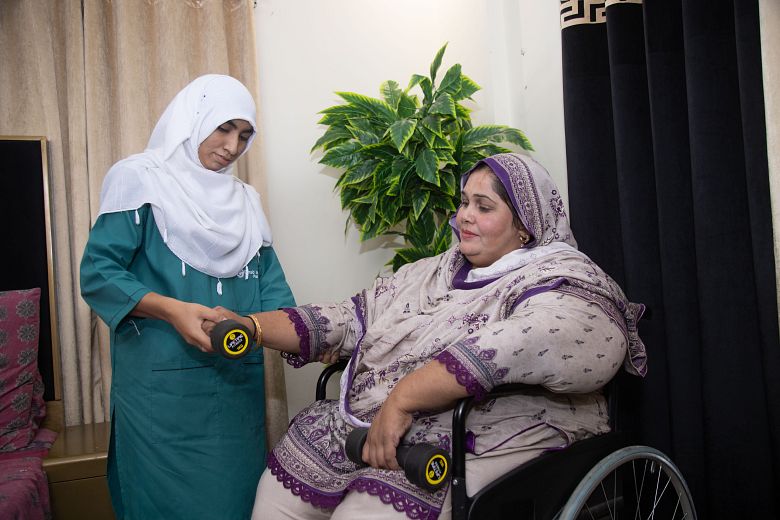The loss of interest in once-enjoyable activities, feelings of hopelessness, and difficulty managing daily routines may indicate depression in an older adult. This condition is not limited by age; it can affect seniors as deeply as younger individuals, influencing appetite, sleep, energy levels, and social engagement.
Promoting healthy habits—such as regular physical activity, balanced nutrition, and sufficient rest—can support improved mood and resilience. Encouraging engagement in purposeful activities and recognizing small accomplishments also plays a vital role in recovery.
Acknowledging the signs of depression is the first step. With compassionate support and professional care, older adults can restore hope, regain fulfillment, and enjoy their later years with dignity and joy.

How to Help Elderly People with Depression?
Supporting an elderly loved one with depression requires patience, respect, and understanding. Small but consistent steps can significantly impact their recovery and overall quality of life.
1. Communicate with Respect:
Speak to them empathetically rather than condescendingly. Older adults are not children; they appreciate having a voice in their decisions.
Listening patiently and acknowledging their feelings can strengthen trust and enhance their mental well-being.
2. Reduce Loneliness and Isolation:
Encourage them to stay socially active. Regular visits, phone calls, or outings can help alleviate loneliness.
Engaging in volunteer work, joining community groups, or participating in shared hobbies can also bring purpose, improve mood, and boost cognitive health.
3. Encourage Healthy Eating:
A balanced diet plays a vital role in mental health. Support your loved one in eating healthy meals that include fruits, vegetables, lean proteins, and whole grains.
Limiting sugar and processed foods, staying hydrated, and considering supplements like vitamin B12 (if advised by a doctor) can help improve mood and energy levels.
4. Keep Them Physically Active:
Exercise serves as a natural mood booster. Light activities such as walking, chair yoga, or water aerobics can alleviate depressive symptoms, enhance mobility, and increase energy levels. Choose activities they enjoy to keep them motivated.
5. Suggest Counseling:
Professional counseling can help elderly understand the causes of their depression, replace negative thought patterns, and develop new coping skills. A licensed therapist or counselor provides a safe space for discussion and healing.

6. Explore Senior Living Options:
A senior living community can provide social connections, safety, and a sense of purpose for seniors living alone. These communities encourage engagement, independence, and activities that support emotional and physical health.
7. Stay Involved and Supportive:
Invite them to participate in activities they once enjoyed, plan regular family visits, and remind them that they are not alone. Encourage them to stick with their treatment plan and watch closely for signs of worsening depression or suicidal thoughts, seeking immediate help if necessary.
Symptoms of Depression in Elderly Individuals
Due to stigma or a belief in self-reliance, many seniors may be reluctant to disclose feelings of sadness or diminished interest in activities. Early recognition of these symptoms is critical, as untreated depression can severely impact quality of life.
With appropriate treatment and support, however, recovery is achievable. Medical evaluation is recommended if multiple symptoms persist for longer than two weeks.
1. Lack of Interest in Hobbies and Activities:
Seniors experiencing depression may lose interest in leisure activities such as sports, music, social events, or intimacy. They often turn down invitations and avoid social interactions.
2. Withdrawing from Others:
An adult who is generally sociable may abruptly begin withdrawing from family and friends, and sustained isolation can contribute to depression.
3. Disturbed Sleep Patterns:
Depression can interfere with sleep, making it hard to fall asleep or stay asleep. Others may oversleep and spend most of the day resting due to low motivation.
Read More: How Seniors Can Deal With Insomnia? Try These Tips for a Better Sleep
4. Changes in Appetite and Weight:
Depression often changes eating habits. Some seniors may lose their appetite, while others may eat more and gain weight.
5. Mood Instability:
Seniors with depression may go through quick mood changes, shifting from sadness to irritability or anger. Such mood swings are a common sign.
6. Constant Fatigue:
Persistent low energy and tiredness are strong signs of depression. Simple daily tasks may feel overwhelming or take significantly longer to complete.
7. Problems with Memory and Focus:
Depression may impair cognitive functions such as memory and concentration. Older adults may often experience difficulties with planning and decision-making.
8. Hopeless or Negative Thoughts:
Older adults with depression may develop feelings of worthlessness or view themselves as a burden to others. Persistent hopelessness or expressions related to death must always be treated with seriousness.
Causes of Depression in Older Adults
Aging often brings significant life transitions that may heighten the risk of depression. Although not all challenges result in depression, certain factors increase vulnerability in older adults.
1. Health Challenges:
Chronic illnesses, disabilities, or ongoing pain can severely affect both physical and mental health. Conditions such as stroke, thyroid disease, vitamin deficiencies, cancer, and even side effects from medications—like blood pressure drugs, steroids, or painkillers—can contribute to feelings of depression.
Reduced mobility and dependence on others may also lead to feelings of frustration and a loss of dignity.
2. Social Isolation:
Many seniors experience diminished social circles due to losing friends, family relocation, or limited mobility.
Living alone or being unable to drive can deepen feelings of loneliness, limiting regular social interactions and increasing the risk of depression.
3. Loss and Bereavement:
The loss of a spouse, close companion, or even a pet can trigger profound grief. Additional losses—such as declining health, diminished independence, or relocation from a long-held home—may also significantly impact emotional well-being. When such feelings persist for several months, they may progress into depression.

4. Reduced Sense of Purpose:
Retirement can sometimes bring about a loss of identity, financial security, and self-confidence. Physical limitations may prevent older adults from participating in meaningful activities, leaving them feeling purposeless or disconnected.
5. Fear and Anxiety:
Concerns related to mortality, deteriorating health, financial insecurity, or fears of neglect and abuse can intensify stress and significantly contribute to depression in older adults.
6. Additional Risk Factors:
Additional contributing factors include inadequate sleep, physical inactivity, caregiver burden, a personal or family history of depression, and excessive alcohol consumption.
In certain cases, depression arises without an identifiable cause, stemming instead from age-related changes in brain chemistry.
Treatment for Depression in Older Adults
Depression in elderly individuals can be effectively treated with the proper care, regardless of age.
A healthcare provider can help create a personalized treatment plan that often includes a combination of medical, psychological, and lifestyle approaches.
Read More: 7 Reasons Why Personalized Care Plan is Important for Seniors
1. Medical Treatments:
Antidepressant medications are commonly prescribed and can be very effective for seniors, particularly in cases of moderate to severe depression. It’s essential to note that these medications may take longer to show results in older adults. Therefore, doctors typically recommend continuing them for at least 6 to 8 weeks before evaluating their effectiveness.
If medication proves ineffective, doctors may consider alternative treatments, such as Electroconvulsive Therapy (ECT) or Repetitive Transcranial Magnetic Stimulation (rTMS). Both are safe and effective options for severe or treatment-resistant depression.
2. Psychotherapy:
Talk therapy is a well-established treatment for depression. Mental health professionals frequently use Cognitive Behavioral Therapy (CBT) and Interpersonal Therapy (IPT).
These therapies help individuals identify and change negative thought patterns, enhance coping skills, and develop healthier emotional responses.
Sessions can be arranged for older adults with hearing or vision impairments to ensure they are accessible.
3. Lifestyle and Self-Help Approaches:
For those experiencing mild to moderate depression, lifestyle changes can significantly aid recovery. Staying connected with family, friends, and participating in community activities can help reduce feelings of isolation and improve mood.
Gentle movement-based routines, such as stretching or group fitness sessions, can help restore energy and act as a natural antidepressant.

4. Professional Evaluation:
A thorough medical evaluation is crucial because certain medications or medical conditions can mimic symptoms of depression. Doctors may conduct physical exams and laboratory tests to rule out any underlying causes before confirming a diagnosis.
If a healthcare provider diagnoses depression, they should refer the patient to a mental health professional, such as a psychologist or psychiatrist, to ensure that the patient receives appropriate care.
When to Seek Medical Help for Depression?
If depressive symptoms persist for two weeks or longer, it is crucial to seek medical evaluation. Physicians will inquire about emotional and physical symptoms, review medical history, and may conduct tests to rule out conditions such as thyroid disorders that mimic depression.
Following assessment, a doctor can diagnose depression, develop a treatment plan with tailored goals, and connect patients with appropriate support services. Referrals to mental health professionals, such as psychologists or psychiatrists experienced in geriatric care, may also be provided.
Immediate help should be sought if thoughts of self-harm arise. Individuals are advised not to remain alone and to contact trusted family members, visit the nearest emergency department, call emergency services, or arrange an urgent medical appointment.
How ConsidraCare Can Help
ConsidraCare provides compassionate support for seniors living with depression. Our caregivers provide daily assistance, emotional support, and personalized plans that help seniors stay active, connected, and dignified—bringing comfort and peace of mind to their families.
Conclusion:
Depression in elderly people represents a serious yet highly treatable condition. Early recognition and timely intervention can significantly improve the quality of life. With appropriate treatment, seniors can restore hope and a renewed sense of purpose.
Importantly, seeking assistance reflects strength rather than weakness. Empathy, professional guidance, and comprehensive support are essential in promoting long-term mental health and overall well-being.
FAQs
1. What complications can depression cause in older adults?
Untreated depression can exacerbate existing health issues, increase the risk of memory loss, reduce independence, and may even lead to suicide.
2. How can you help lift the mood of an elderly person with depression?
Encourage light physical activity, healthy meals, engaging hobbies, and regular social interaction. Patience and emotional support are crucial.
3. What should you avoid saying to someone with depression?
Avoid dismissive statements like just snap out of it or others have it worse. Instead, listen with empathy and offer reassurance.
4. Why is depression in seniors often overlooked?
Many people mistake it for normal aging or physical illness, and the stigma surrounding mental health often causes people to overlook it.
5. Which antidepressants are commonly used for older adults?
Doctors often prescribe SSRIs (such as sertraline or escitalopram) because they are generally safer and better tolerated.



